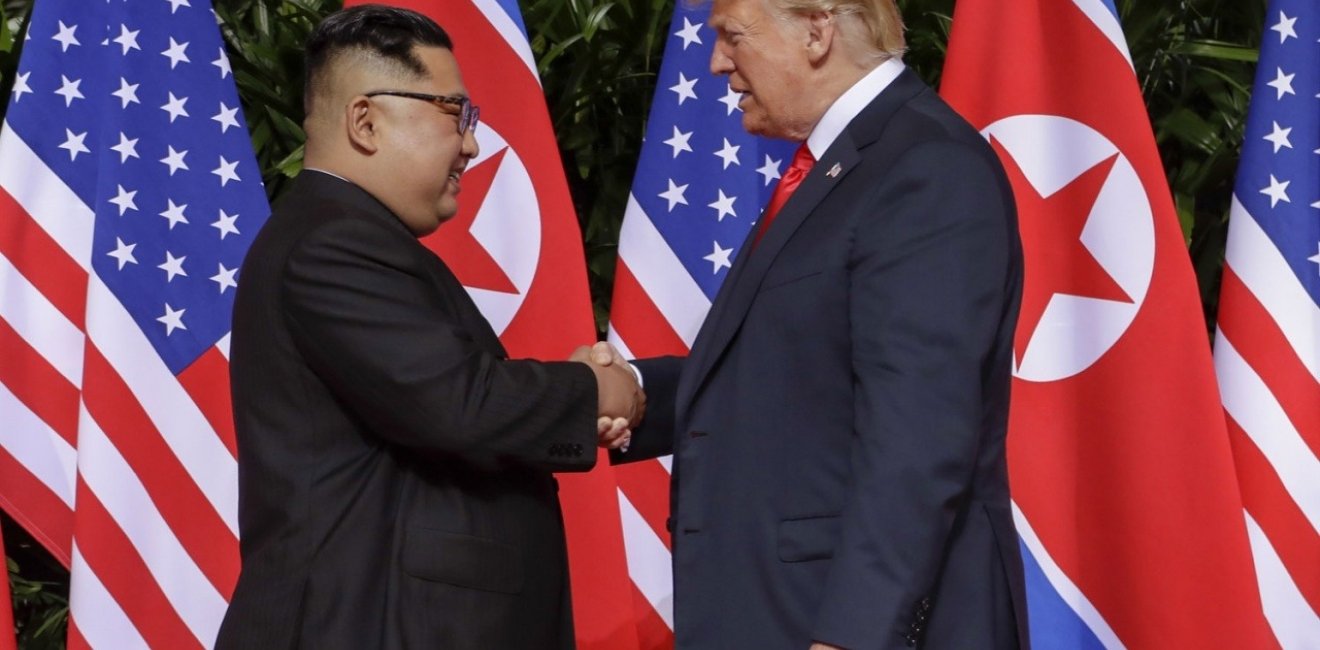
A blog of the Indo-Pacific Program
We have a timeframe: late February. We have rumors of a location: Vietnam. What we don’t have yet, as the countdown to President Donald Trump’s second date with Kim Jong Un begins, is a roadmap promising that their next summit will be more than just a photo op.
It’s been seven months since their first meeting in Singapore last June in a summit that held the tantalizing promise of serving as a historic turning point in North Korean-U.S. relations.
But it has been Kim who largely has benefited from a meeting that gifted him enormous legitimacy internationally and at home. Neither his father nor his grandfather, the late leaders of North Korea, had ever held a summit with an American president; the images of Kim standing shoulder to shoulder with Trump cemented the impression at home that he is a man respected by the world’s most powerful figures and suggested that he was poised to accomplish the main task bequeathed to him by his forebears: resolving the Korean War standoff with the United States.
President Trump, meanwhile, had promised that the threat posed by North Korea’s nuclear program was over. Yet in reality, the past seven months have brought us no closer to the denuclearization of North Korea. The diplomacy did yield a reduction in tensions, with none of the nuclear or missile tests that brought the Korean Peninsula to the brink of war in 2017. However, the sparsely worded Singapore Summit declaration has not resulted in any verified dismantling or destruction of nuclear facilities, weapons or fissile material.
At the very least, the meeting did spark an epistolary bromance between the two men, and even cringeworthy exchanges of mutual flattery are preferable to the threats of “fire and fury” and nuclear war that so alarmed the world a year and a half ago.
Both men have unfinished tasks. Kim needs to establish some sort of reconciliation with the United States so that his country can move on from the Korean War and focus on building North Korea’s emaciated economy. Trump needs stronger commitments on denuclearization in order to back his claim that North Korea no longer remains a nuclear threat.
There is a risk to rushing headlong into this second summit, as they did the first, without adequate preparation.
But there is a risk to rushing headlong into this second summit, as they did the first, without adequate preparation.
The first time, it may have made sense to get Kim to the negotiating table by according him the respect of a summit. The prideful North Koreans respond to shows of respect; offering a meeting with the U.S. president was an astute gamble.
But failing to convert the summit into a clearly delineated process that will lead us down a path toward North Korea’s denuclearization will only benefit the North Koreans — and could end up putting Americans and its allies in Northeast Asia at greater security risk.
The North Koreans likely are pressing for the two leaders to declare an end to the Korean War, a statement that is not a formal peace treaty but could serve as a starting point for multilateral negotiations on a long-term peace mechanism, a goal Kim himself laid out for 2019.
The prospect of declaring an end to the war no doubt appeals to President Trump, who is looking for a quick victory to offset a string of troubles at home and to establish his place in history. The case for a political end-of-war declaration, championed by South Korea's president as well, is compelling. But the consequences to regional security must be carefully considered. Such a declaration would be a massive concession, and must be carefully leveraged in exchange for concrete moves toward denuclearization.
The North Koreans are savvy operators. They’ll be looking to gain as many concessions as they can up front, and to hold onto their nuclear weapons and ballistic missiles as long as they can. President Trump may say the threat is over but the U.S. military clearly knows otherwise. North Korea remains an “extraordinary threat,” according to the latest Missile Defense Review released last week.
In reality, neither side will get exactly what it wants.
In reality, neither side will get exactly what it wants. But knowing the end goals, the two sides should map out, step by step, what actions and concessions would satisfy both parties to enable the process to keep moving forward.
Kim would prefer to leapfrog over the president’s envoys and deal directly with Trump; he’s gauging that Trump is easily swayed by emotion and flattery, and disinclined to do his homework. If Trump wants his next summit to be more than just fodder for North Korean propaganda, it is essential that he continue to empower working-level negotiators to nail down the details. Only by letting the officials tasked with the mission to work day in, day out on crafting a viable roadmap to denuclearization can we begin to expect that this second summit will be more than just theater and propaganda.
It’s good to see that channels of communication are open again between Washington and Pyongyang after the abrupt postponement of a high-level meeting last November. With just a month before the proposed summit, the challenge is for the Trump administration to use that access to nail the North Koreans down on what each side will offer to get us closer to the goal of disabling the North Korean nuclear threat.
Washington has leverage; they need to be smart in using it.
Follow Jean H. Lee, director of the Hyundai Motor-Korea Foundation Center for Korean History and Public Policy, on Twitter: @newsjean.
The views expressed are the author's alone and do not necessarily represent the views of the Wilson Center. Copyright 2019, Asia Program. All rights reserved.
Author

Journalist and former Pyongyang Bureau Chief, Associated Press

Indo-Pacific Program
The Indo-Pacific Program promotes policy debate and intellectual discussions on US interests in the Asia-Pacific as well as political, economic, security, and social issues relating to the world’s most populous and economically dynamic region. Read more


Hyundai Motor-Korea Foundation Center for Korean History and Public Policy
The Center for Korean History and Public Policy was established in 2015 with the generous support of the Hyundai Motor Company and the Korea Foundation to provide a coherent, long-term platform for improving historical understanding of Korea and informing the public policy debate on the Korean peninsula in the United States and beyond. Read more





